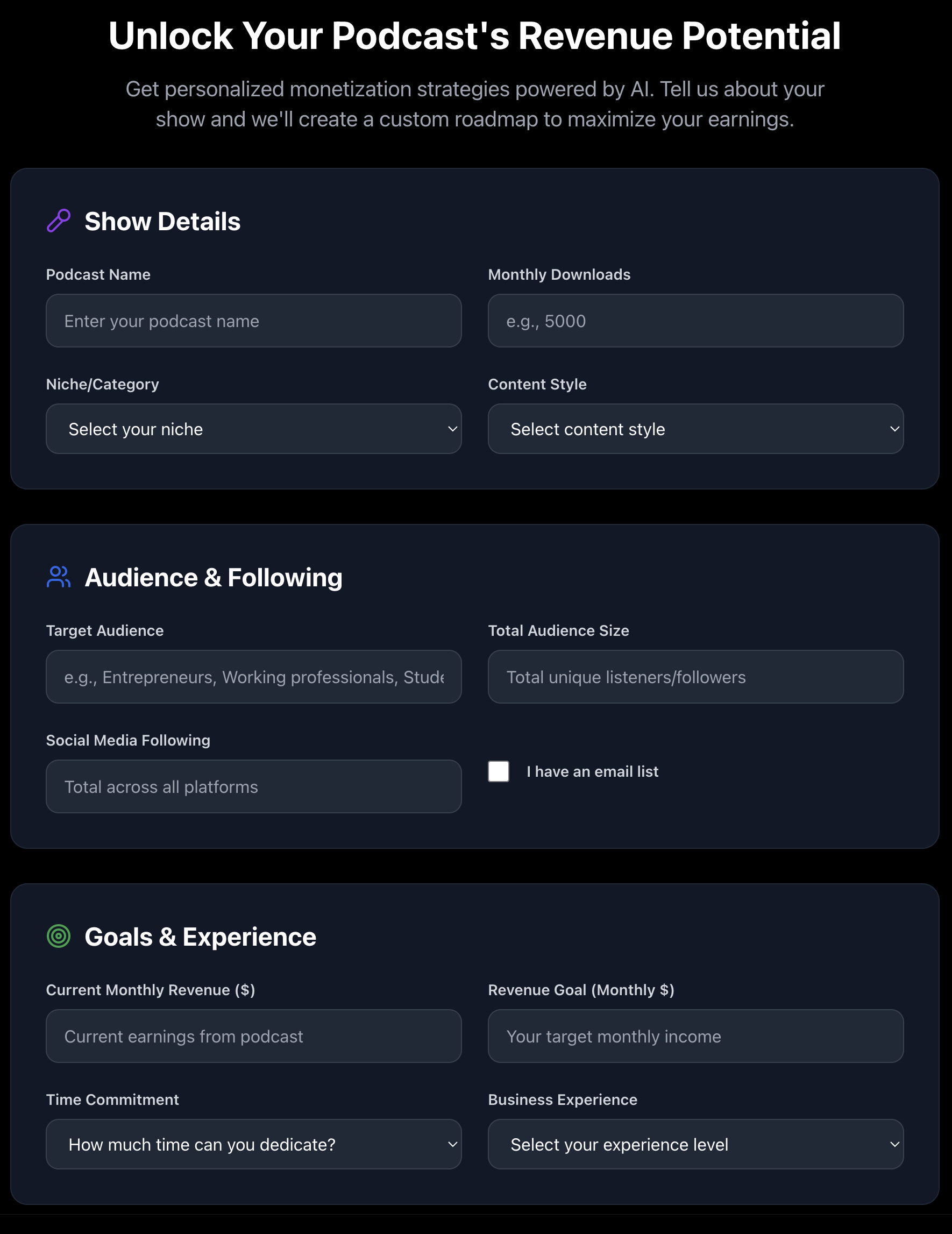Podcasting Tools
Podcasting Tools 2025: The Only Guide You’ll Ever Need
By Matt., YouTube podcaster since 2015
Podcasting has exploded—but with millions of shows competing for attention, it’s no longer enough to just hit “record” and hope for the best.
What tools should you really use to plan, produce, and promote your podcast?
How do you avoid wasting time (and money) on tech that sounds great but doesn’t deliver?
This guide breaks down the real tools real podcasters rely on—organized by the four essential stages of podcasting. You’ll get field-tested recommendations, pricing, pro tips, and links to more resources so you can make smart, strategic choices.
Click Here To Use Our Monetization Strategy Tool
Our Methodology
To select the tools below, we evaluated:
- Ease of use (onboarding time, UI clarity)
- Feature depth (does it solve multiple pain points?)
- Pricing (free vs. paid ROI)
- Support & reliability (uptime, documentation, user forums)
- Integrations (Zapier, Descript, Calendly, etc.)
Each tool below was either:
- Used regularly
- Tested against 2–3 competitors
- Recommended consistently by top-tier creators
1. Planning & Show-Notes Tools
These tools help structure episodes, assign hosts, collect guest details, and keep things consistent.
For scripting templates and strategies, see our
Podcast Script Examples.
Alitu Showplanner
- Best for solo podcasters and structured series
- Drag-and-drop episode builder, topic tracking, and voice note embeds
- Pro tip: Use templates for recurring formats (Q&A, panel, etc.)
Airtable or Notion
- Best for collaborative teams or remote workflows
- Build episode pipelines, guest intake forms, and checklists
- Tip: Connect with Zapier to auto-create guest tasks
Trello + Google Docs
- Best for beginners on a budget
- Simple card-based scheduling and collaborative scripting
2. Recording & Remote Interviews
Whether you’re remote or in-person, these tools get your raw audio and video. If you’re looking for remote recording options,
check our deep-dive here.
Click here to learn more about StreamYard
StreamYard
- Best for video-first podcasts and simulcasting
- Stream to YouTube, Facebook, LinkedIn; cloud-recorded interviews
Learn more about StreamYard
Zoom PodTrak P4
- Best for portable, multi-mic hardware
- Built-in mix-minus, SD recording, easy for traveling shows
Read our Zoom PodTrak P4 guide
Cleanfeed
- Best for high-quality browser-based audio
- Studio-grade quality, local backups, no installs required
3. Editing & Post-Production
Clean it up, enhance the sound, and get it ready for listeners. Explore more on podcast editing software options.
Descript
- Best AI editing + transcript tools
- Edit audio by editing the transcript. Auto-remove filler words.
- Bonus: Overdub lets you re-record lines with AI
Adobe Audition
- Best for pro audio engineers
- Full DAW with multitrack mixing, noise reduction, EQ
Alitu
- Best one-click cleanup and theme music
- Noise reduction, volume leveling, and auto-uploads
Want to add royalty-free music? Check out our Free Podcast Music Resources and Royalty-Free Podcast Music Guide. If you’re looking for an editor or curious about pricing, see how much to charge for podcast editing.
4. Hosting, Monetization & Analytics
Get it online, measure your reach, and turn downloads into dollars. Compare your options in our
Monetization Platform Roundup Need to convert an MP4 to audio? Use our MP4 to MP3 Converter
Podbean
- Best all-in-one host with monetization built-in
- Dynamic ads, listener support, and video hosting
Click to try Podbean risk-free
Libsyn
- Best for enterprise or multi-show networks
- Advanced analytics, IAB certification, private podcasting
Buzzsprout
- Best for new podcasters with a tight budget
- Simple UI, free plan, magic mastering option
Want to dive deeper into analytics? See our Podcast Analytics Tools guide.
Bonus: Comparison Table
| Tool | Best For | Pricing Start | Highlight Feature |
|---|---|---|---|
| Alitu Showplanner | Episode prep | $13/mo | Voice notes, templates |
| StreamYard | Video interviews | Free / $20/mo | Live-stream + cloud record |
| Descript | Editing + transcripts | Free / $12/mo | Edit by text, Overdub |
| Podbean | Hosting + monetization | Free / $9/mo | Dynamic ads, listener tips |
FAQ
What is the best tool to start a podcast?
Start with a reliable planning tool like Notion or Alitu Showplanner. Then add Descript for editing and Podbean for hosting.
Can I run a podcast with just free tools?
Yes. Try Audacity for editing, Zoom for interviews, and Buzzsprout’s free plan for hosting. As you grow, upgrade.
What is the best tool for podcast interviews?
Cleanfeed offers pro-grade audio with no installs. For video, StreamYard is the easiest.
How do podcasters edit audio like a pro?
Descript is great for beginners, while Adobe Audition is best for advanced users.
What’s the easiest way to publish a podcast?
Platforms like Podbean and Buzzsprout walk you through it. Upload, fill in your details, hit publish.
Do I need a separate tool for show notes?
It helps. Notion, Trello, or Alitu all support episode scripting and notes.
Final Thoughts
Every tool above solves a specific problem—don’t feel like you need them all. Pick one or two per stage and master them. As your show grows, layer in more.
Want to go deeper? We cover everything from professional podcast names to microphone techniques to background audio removal.
You can also explore our:
- Podcast Equipment Guide
- Podcast Name Generator
- MP4 to MP3 Converter
- Free Podcast Music Resources
- YouTube Revenue Calculator
Got questions? Leave a comment or contact us. Want more like this?
Join our newsletter.
- Best Podcast Cameras in 2026: Creator Picks for Every Budget
- Yamaha MGX Series for Podcasting: The Practical Guide (MGX12 vs MGX16 vs MGX-V)
- What Is Streamyard, This Weird Tool That Helps You Run a Professional Live Show
- What the “Async” Rebrand Actually Means for Your Old Podcast Files
- Why Serious Podcasters Are Moving to 10GbE NAS
